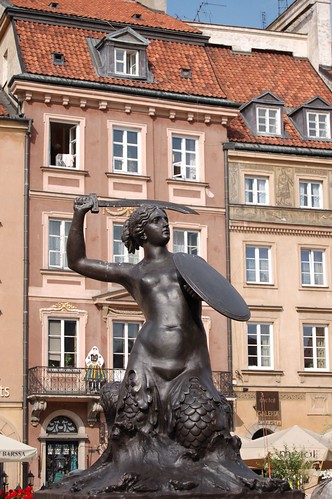Wars is pronounced Vahrs and Sawa is pronounced SAH-vah.
Wars and Sawa are two legendary figures which helped shaped Warsaw.
There are several versions of this story but this is the one I tell my children.
I use Polish words throughout the legend to help teach my children Polish. See the glossary at the end for pronounciation and meaning.
Photo by s3k, from Wikipedia
The Legend of Wars and Sawa, A Love Story
Dawno temu, when Poland was young, the lands were filled with forests, fields, and wild animals. Kings and mythical creatures roamed the land.
Warszawa was not yet a town, let alone the huge, bustling city it is today. In fact, Warszawa was not yet even the capital of the Polish kingdom. It was just a hut owned by a fisherman on the banks of the Wisła river.
This fisherman was called Wars and he was a great fisherman. He kept his nets straight, knew where to fish, and kept his gear in good working order. He was also kind- he always threw back fish which were too small or which he could tell were pregnant and never caught more than he needed to feed himself and a small amount to sell on the market.
At the end of his hard day, he would always say a prayer to thank God for giving him another day to fish and would always say a thank you for the fish he caught.
Wars was not only these things, he was also handsome.
One day, he saw a beautiful Syrena by his home. She was at the sandy bank, under a Wierzba tree. The same willow trees Chopin composed music about.
Her name was Sawa. She was beautiful. Blonde, long hair. Blue eyes. Pale skin. And a mermaid's tale. She was singing a song, the kind humans no longer remember how to sing, about Nature, life, death, the wilderness of the Earth and Sea.
Sawa had been watching Wars for many weeks after having travelled down the Wisła from the Baltic Sea. She knew he was kind, humble, not selfish at all. She had fallen in love.
Wars approached her cautiously, trying not to scare her. He sat down a few feets from her on the sandy bank and listened as she sang to him more.
At the end of the song, she waved and disappeared under the waters.
This happened at the end of the day between them for several days.
Finally, Wars could not stand it anymore. He stopped her singing before she could leave him.
"I love you. I don't know how but I feel like I've always known you. Please, stay with me. Be my wife."
Sawa looked at him with love in her eyes and said "And I love you. But I am a Syrena and you are man. I must live in the waters or I will die. And you must live on Earth so that you can breathe and live on, for now."
Wars was devastated at this and said, "But what am I supposed to do? I love you, I cannot imagine you not in my life. Please, there must be a way."
Sawa told Wars, "I will stay here in your river and will watch over you forever. And, I will watch over our children and our children's children and so on. But our children must live on land with you."
And so it was. They saw each other throughout the day while Wars fished and Sawa swam through the waters, keeping their children safe as they swam and played and grew.
Years passed happily for them together, and then Wars passed away, as humans do. But Sawa still swims in the Wisła, watching over their children's children.
She guards Warszawa, which is named in memory of their love for one another, and sings songs in the cool shadows of the willows, about Nature, life, death, the wilderness of the Earth and Sea. And love.
Glossary:
Dawno Temu - pronounced Dahv-noh Teh-moo, meaning Long ago, or Once upon a time.Warszawa - pronounced Vahr-SHAH-vah, meaning Warsaw.
Wisła - pronounced VIS-wah, meaning the Vistula River.
Syrena - pronounced Sih-REH-nah, meaning Mermaid.
Wierzba - pronounced Vee-ehr-zbah with the "rz" sound as a "z" pronounced with tongue in same position as if you were rolling your "r", meaning Willow.
For more information on the Warsaw Mermaid, see in Polish the Wikipedia Warszawska Syrenka. Also, Warsaw Coat of Arms.
Na razie...
Related Posts:
The Golden Duck of Warsaw and Brewster's MillionsA Collection of Polish Kings and Lech I
Teaching Children About Poland (I love the site in my post & explain why) Note: not endorsed
Books for Polish American Children
Our Honeymoon Daytrip in Warsaw

No comments:
Post a Comment